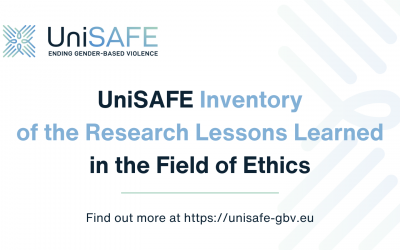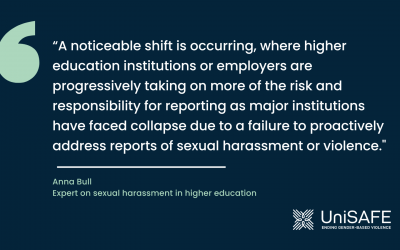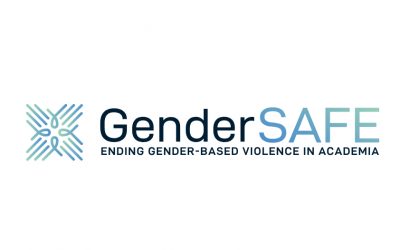Do you feel safe in academia? Share you experience on gender-based violence in universities and research organisations!
The UniSAFE project tackles gender-based violence in academia and research organisations by gathering and examining personal experiences related to this issue as well as institutional responses. After launching a large-scale survey among 45 universities and research organisations’ staff and students, we would particularly like to give voice to researchers whose experience and stories are often overlooked or unheard, due to their specific situation in academia.
Individual, online interviews
From January to April 2022, the project will conduct a series of individual interviews with researchers all over Europe who have experienced or witnessed gender-based violence, may it be physical, psychological, sexual violence, harassment, online or offline.
Our aim is to examine these experiences in detail and analyse the relationship between the prevalence of gender-based violence and its determinants and consequences. How active are universities and research organisations in preventing, protecting, and prosecuting gender-based violence?
The interviews will be individual, online, semi-structured interviews with researchers all over Europe, conducted in English or in the researcher’s national language when possible. The shared knowledge and/or observations will contribute to develop operational tools to improve the prevention, protection, prosecution, provision of services, partnerships and policies at universities and research organisations.
Share your experience!
UniSAFE is looking for researchers – including PhD students – having suffered or witnessed gender-based violence, particularly in one of the following situations:
- at an early-career stage (including PhD students)
- on a non-permanent contract in a university or a research organisation
- as a mobile researcher visiting a university or research organisation abroad, including Marie Curie fellows.
Experiences or witnesses of violence in academia outside these situations are also welcome. Participants will be invited to share their stories and their observations of institutions’ response or lack of responses in individual, online, and semi-structured interviews in English or in their national language when possible.
The shared knowledge and/or observations will contribute to develop operational tools to improve the prevention, protection, prosecution, provision of services, partnerships and policies at universities and research organisations.
We understand that it can be uncomfortable or even painful to share such a sensitive experience. We are however also convinced that implementing real institutional change starts by gaining solid knowledge of the issue to be tackled. Therefore, we commit to strictly keep all sensitive information confidential and anonymous.
If you are interested or have a question regarding these interviews, please leave us your contact details in this form. The contact point for this part of the UniSAFE project is the Lithuanian Center for Social Sciences and they will get back to you concerning your questions and potential interview arrangements.



